Non-Fiction: Loneliness And Jackdaws
This piece was written in September 2024.
I don’t know exactly what it is, but there is something particular about me that just rubs human beings the wrong way. It has followed me like a spectre my whole life; from the merciless bullying I experienced in childhood, to the frequent unmistakable looks of “you don’t belong here,” I still experience as an adult. Though the world is far kinder to the strange adult than it ever was to the strange child, a part of me has simply written off the human race. They dislike me; I have done all I could, and it hasn’t changed. There is nothing more to be done.
For as long as I can remember, my most treasured friendships have been with animals; cats, hamsters, a rabbit, and even a python. My wrongness doesn’t phase them. They can’t see the invisible human force that has marked me as forever less-than.
A relationship with an animal is based on something ancient and sacred. The sharing of food. The slow, cautious negotiation of mutual boundaries. The eventual, primal trust that one will never do the other harm. An animal can see in you something mankind has grown too soft to detect. To them, I am not a broken human, but a creature of its own that deserves its own dignity.
When I went to university, I sorely missed the presence of animals in my life. I left my three cats and pet python at home, and though I would frequently visit them, without everyday contact with beings that understood me my self-esteem started to wither. My wrongness would make a stranger of me for the umpteenth time in my life. Even a pain you have accepted as an inevitability can still sting.
That’s when I found them.
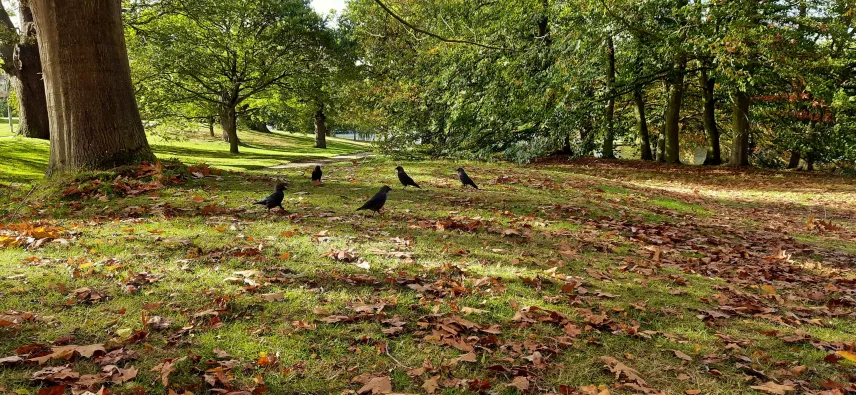
A photo taken shortly after I started feeding the jackdaws. They were very shy at this point.
I chose the university I attended partially for the campus; a large green space with lakes and walking trails and a diverse array of beautiful trees. Those trees provided a roosting space for a considerable clattering of jackdaws.
They weren’t entirely unacquainted to human contact; they would visit central campus during the daytime to scrounge for scraps around the various food stalls; but they didn’t exactly like people for the company. To the average campus jackdaw, a human being was a lumbering insentient column that occasionally dropped a crisp or a crumb of sausage roll. They were shooed from picnic tables, and chased away from cafes and restaurants by both the humans and the ferocious presence of the campus cat. Like me, they didn’t quite belong.
So of course, I had to try and reach out.
My efforts were subtle at first: a small bag of peanuts and dried edamame in my coat pocket. When I noticed a jackdaw, I would reach inside and toss a few little snacks onto the ground. They would swoop down upon them, gobble them up, and look at me with a sort of quizzical gaze before flying away. Some people did throw them snacks on purpose, I think. But for someone to do it repeatedly, and to take interest in them while doing so, was very much an oddity.
It didn’t take too long to build up rapport with the clattering. I found that if I drew them away from the bustle of central campus and into the quiet parklands they were far more comfortable with me. They would stay for longer after eating. Inch just that little bit closer. Of course, even just a twitch of my hand would make them fly away, but it was progress.
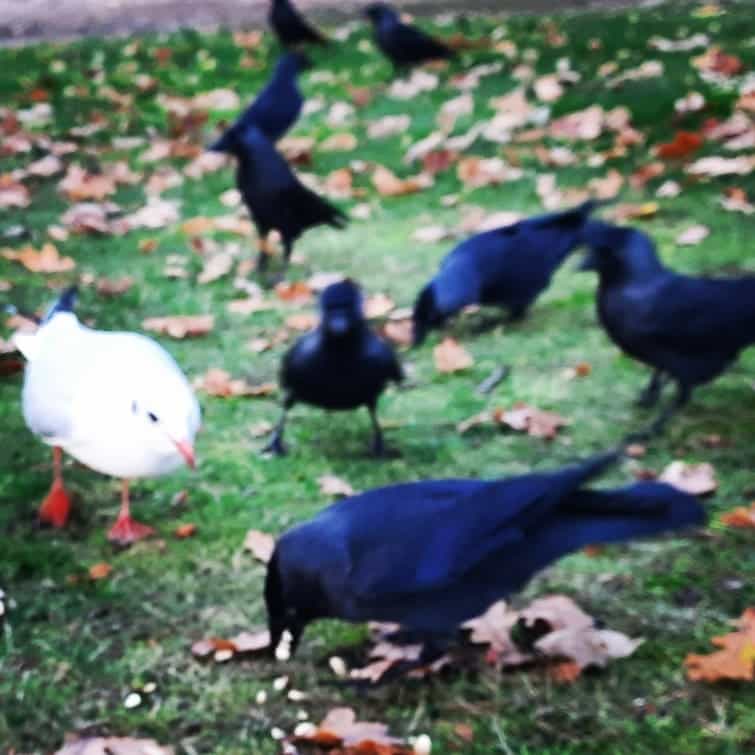
Some jackdaws eating, as well as a very ambitious little gull. Little gulls were tolerated by the clattering, but would get their tails pulled if they took too much food.
If you haven’t spent a lot of time with jackdaws, and corvids generally for that matter, then I think it’s hard to gauge exactly how intelligent they are. When you see them in passing picking at roadkill or calling from the treetops, then perhaps they seem like rather stupid animals. That the hype about their intellect is nothing more than hype.
But when you get close to a jackdaw; have those brilliant white eyes stare directly into yours; then you can see something sharp and smart and familiar in them. A jackdaw is not only intelligent, but intelligent enough to understand that you are also a thinking being. It is watching you, watching its peers, watching for minute clues into what is happening and how it should behave. It is a rational animal. If you are slow, and still, and are generous with your food, then they can learn to enjoy your company.
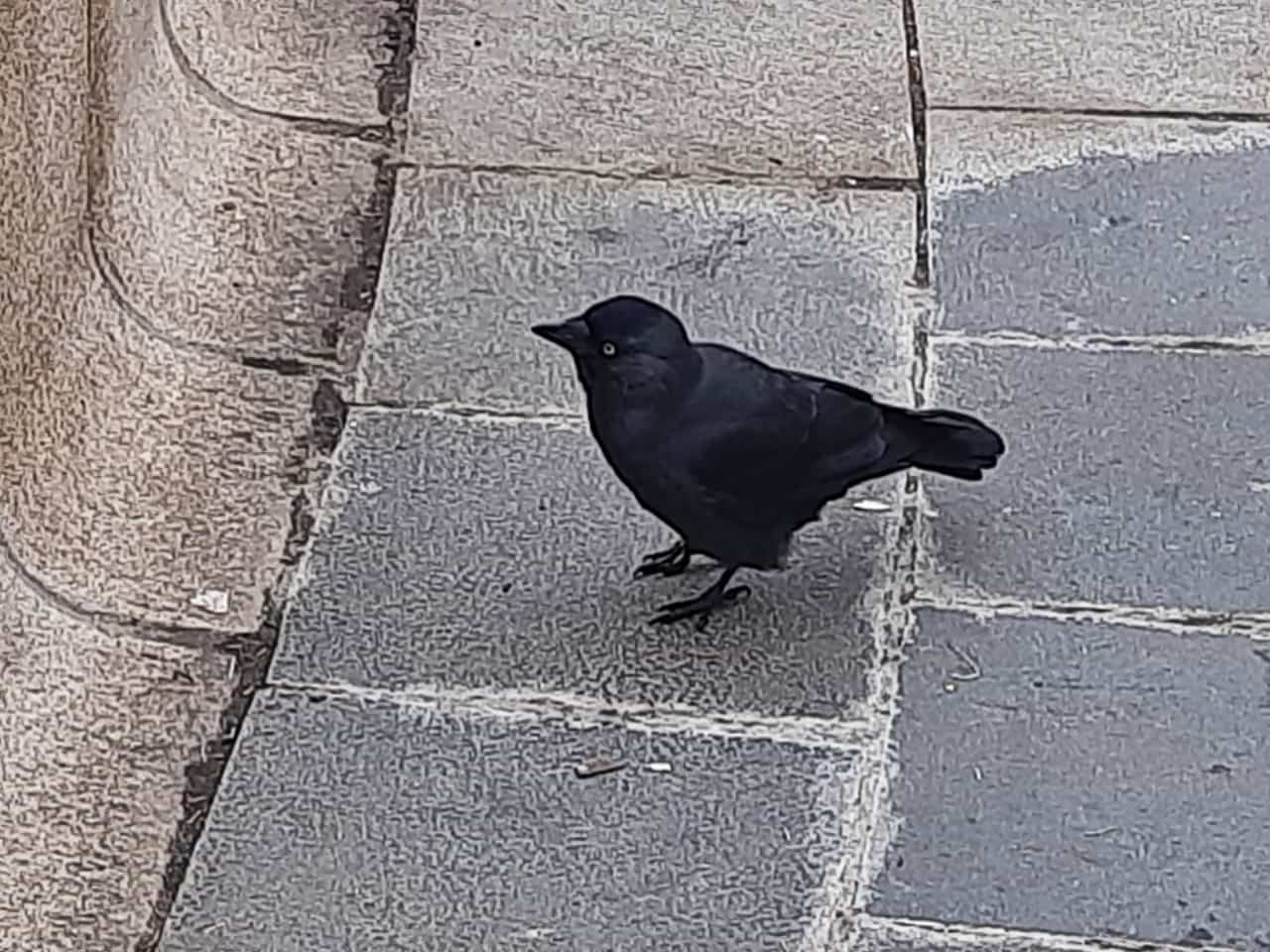
Odin the jackdaw, pictured here on his good side, hanging out in central campus.
As our trust grew, there were a few individuals who started to stand out to me.
One of them I named Odin; a scrappy little bird who was missing an eye. He was by far the most confident member of the flock, which had probably led him into whatever incident caused him to be down one eye in the first place, but it was advantageous when dealing with me. Sometimes, when I was done giving snacks to the others, Odin would follow me into central campus, wait outside of the little corner shop while I got myself some lunch, and then hop up beside me on a bench with the expectation that I’d share. I mostly did, of course, unless I got something really unhealthy. Even then, he’d beg for the junk food.
I once absent-mindedly fed him a red hot cheeto, which to my surprise and horror, he ate without fear or reaction. I found out later that birds do not have the same reaction to capsaicin that humans do, so to him it would not have been spicy. I must’ve looked so silly to him, fretting over the red crumbs around his beak and offering him water. After that, I resolved to have healthier lunches, at least for a while.
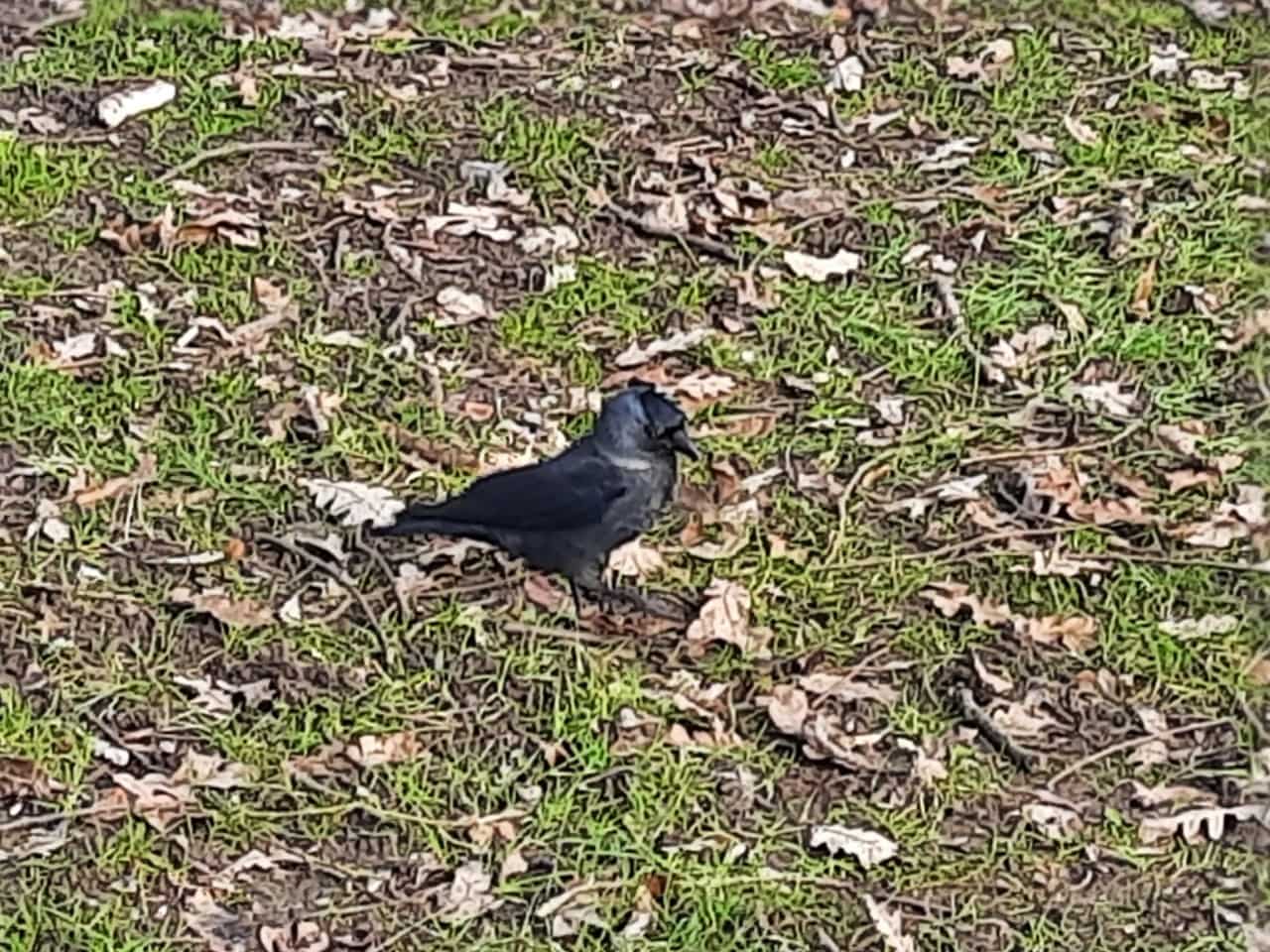
Odin on his bad side, pictured frolicking in the campus park.
I suspect that Odin passed away some time in the summer of twenty twenty-two, as I never saw him during my third year of university. Sometimes I feel pangs of guilt that it was somehow my fault; that his habituation towards me and towards humans in general had led him into some terrible trouble somewhere, perhaps at the claws of the dreaded campus cat. Sometimes I think that it was just his time to go. Sometimes I wonder if he had merely moved on to pastures new, and that wherever he was, he still had friends to give him little snacks.
Another interesting part of the clattering were a pair of carrion crows who had integrated with the jackdaws; forgoing their hearty native caw for higher-pitched jackdaw vocalisations as if they had become bilingual. Despite their integration, they were squarely at the bottom of the pecking order, and I frequently witnessed the jackdaws pulling their tails and snapping at them when they tried to get close to me and my bag of snacks.
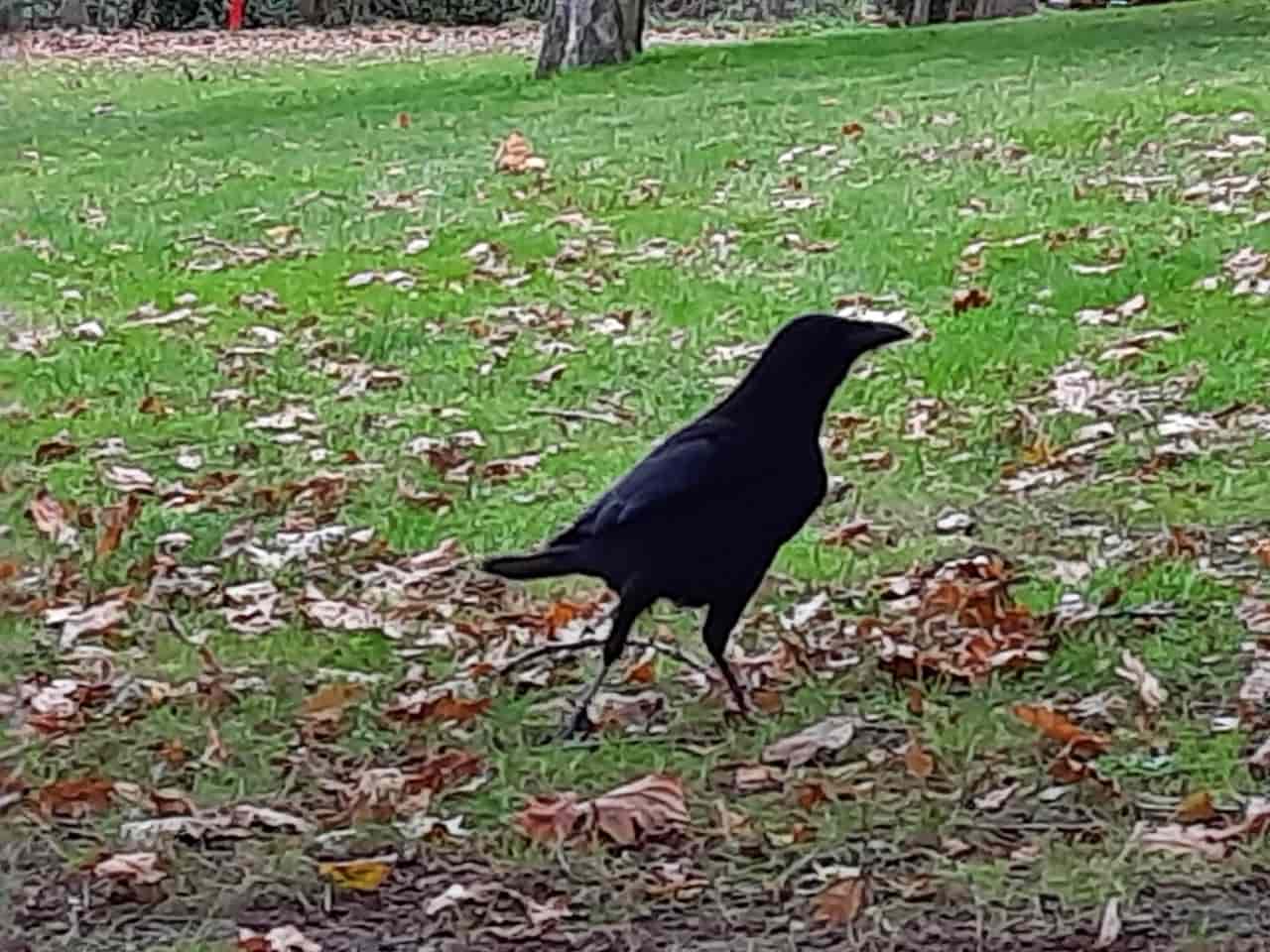
One of the carrion crow pair, looking a little bit nervous.
I did catch them on their own, once, and they got their fill of pumpkin and sunflower seeds. But the jackdaws had firmly made them wary of me. I was their property, and not to be messed with.
Spending all this time with birds made me even more unpopular with humans. For a while, I was almost a campus cryptid; the strange bird lady with the bag of seeds and the black figures circling overhead. I think I enjoyed this a little, though it did sting on the few occasions people pointed and laughed.
There were a few incidents that cemented this. The first happened in the December of twenty twenty-one, on a fine day at about lunch time. I had spent the morning in the library agonising over the reading for my very confusing literary criticism class, and only left for a short lunch break. As soon as I stepped over the threshold, I heard the telltale call.
I was instantly mobbed by jackdaws. They were circling overhead. Pecking at the ground around my feet. Everyone in the vicinity stopped and stared. The worst thing was that I didn’t even have much food for them!
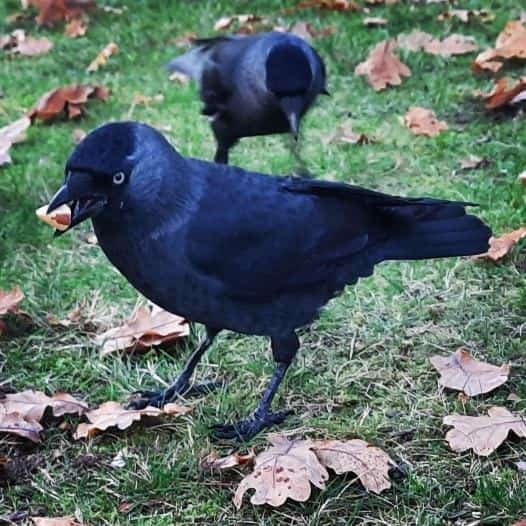
He knows what he did!
I reached into my pocket and pulled out a measly handful of duck food pellets leftover from the previous day. They scoffed them in seconds and continued to mob. It took minutes of them following me around before they realised I didn’t have anything else, and by then practically everyone on campus had seen it. I am forever thankful that nobody filmed this incident and put it on TikTok.
After this incident, I stopped feeding the jackdaws as frequently, and switched up my routine so that they wouldn’t be expecting food at any particular time. This seemed to do the trick. Though they were a bit miffed at me for a while, I was not mobbed again.
The second incident happened in the spring, and was not, in fact, the fault of the jackdaws this time.
Over Christmas, and without my realising, a pair of Canada geese had made themselves at home on campus. They had already made an impression on some other students already, but even as resident bird freak it took me a while to notice them.
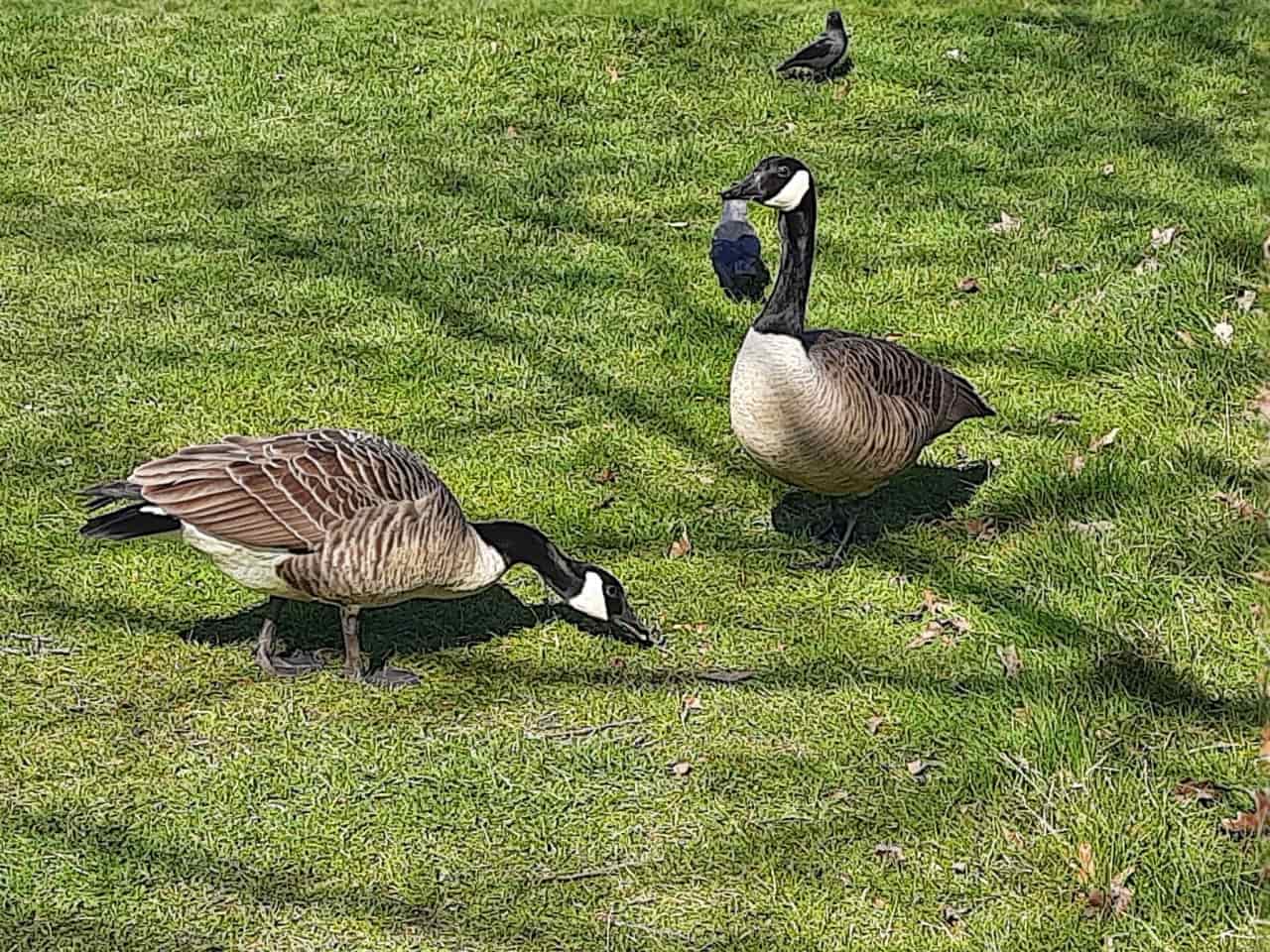
The Canada geese approaching me. Photos taken moments before disaster...
It was a quiet morning on campus, and I was in the park feeding the jackdaws before my writing workshop. It was nice. It was tranquil. And then, there came the honking. The geese had spotted the jackdaws all gathered around me, and were waddling up to see what was going on.
Now, I don’t generally like the way people talk about geese. I don’t think wild animals owe us compliance, and geese can go around policing their own personal bubbles however they want for all I care. If someone goes up and starts prodding them, then they deserve to get snapped at.
These geese seemed okay, and they were approaching me and not the other way around. The more the merrier, I thought. I threw them some food, and they ate it happily.
But then they kept on waddling. I didn’t move. I was sat down in the grass, legs crossed, bag at my side. They got closer to me of their own volition, were given free food, and then just started hissing. What?!
When you are sitting down on the ground, a pair of hissing geese is quite the imposing threat. So I sort of just… Stood up and started backing away. And they kept following. Walking faster.
I was being chased.
I did that sort of speed-walking not-a-run run that people do in public when they don’t want to look like they’re terrified, and they started flapping and sprinting.
They didn’t give up until I approached the campus buildings. I arrived at my class early, breathless, and red-faced.
It turns out that people think you’re strange if you’re chased to class by geese. Huh. Who would’ve thunk it?
But I learned an important lesson from this. The next time I fed my jackdaw buddies, the geese approached once more. They ate, they started hissing and flapping, and… And I didn’t react. I just sat where I was and kept on handing out food. I even gave them a bit of extra as a peace offering.
It was fine. Geese can sense your fear, I think. If you don’t rise to it, then they won’t fight.
But it did cause another problem. Jackdaws are intelligent enough to discern one human from another. I was the food-bringer, so I was the only one they would bother. Geese don’t particularly care to make that distinction. Once I was the food-bringer, all manner of humans were liable to be food-bringers as well.
I remember studying in the top-floor reading room of the student centre, being serenaded by honks as I watched the geese chase people through the large windows. I did feel a little guilty that it was sort of my fault, but it was also very funny.
As my studies progressed, I had less and less time to spend with the jackdaws. My third year was very jam-packed, and health issues meant I had to spend a lot of it away from campus, so the very last time I spent time with them was in the March of twenty twenty-three.
For me, it was bittersweet. I spent a lot more time feeding them than I usually would, and I stuck around until all of the jackdaws had flown away. For them, I’m not sure they noticed anything out of the ordinary.
And then, I left. I wonder if they missed me. I wonder if they just missed the food.
By the time I came back for my graduation that July, I had been forgotten. I watched them swoop and call as my family snapped photos of me in my robes in the campus park, and they paid me no mind whatsoever.
Since my graduation, I have come to miss the relationship I had with the jackdaws. I know they were just wild animals, and I know they wouldn’t have cared if I hadn’t been feeding them, but they gave me something worth getting out of bed for during a profoundly lonely period of my life.
It’s a type of connection I haven’t really been able to find anywhere else. The jackdaws in my home town aren’t nearly as friendly, and feeding ducks and swans doesn’t quite scratch the same itch. Still, my time with the campus jackdaws remains an incredibly fond memory.